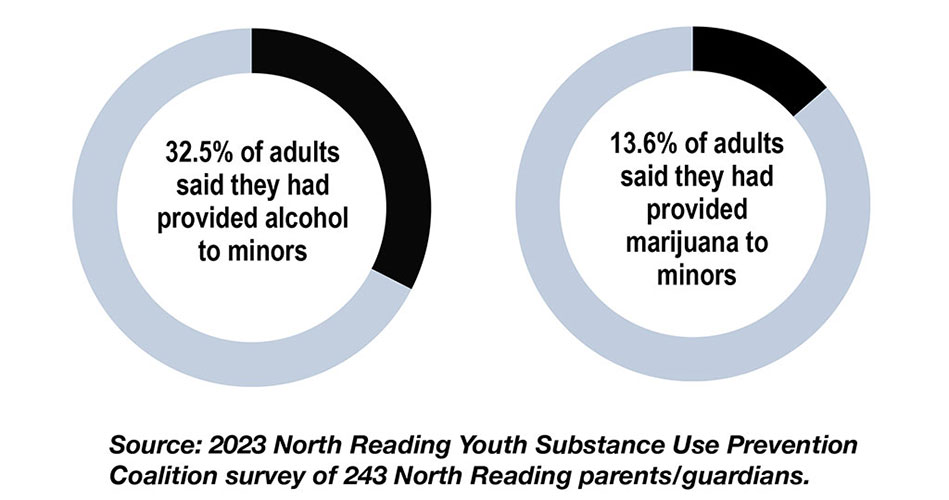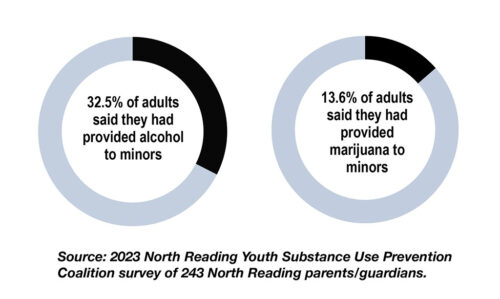Making An Impact is a column authored by members of the Community Impact Team (CIT). The Transcript publishes these articles periodically to inform our readers about the resources and programming available to people of all ages in our community through the CIT’s efforts.
NORTH READING — Starting in mid-2023, the North Reading Youth Substance Use Prevention Coalition (Coalition) sought to uncover adult attitudes and behaviors around youth substance use, particularly those related to alcohol and marijuana. Over four months, 243 North Reading parents and guardians, representing families with students in grades 6 through 12 responded to the Coalition’s survey.
“Each year we hear frustrations from parents about adults providing minors with alcohol and sometimes marijuana. Even complaints about adults using these substances with young people,” said Drug-Free Communities Grant Director Amy Luckiewicz in explaining the core reasons for administering the survey. “But if you look at the North Reading Police data, we simply don’t see that. We wanted to know if there is a perception disconnect or there is more going on than gets reported.”
Some of the key findings of the eight-question survey yielded some clear answers: 8.7% of respondents (21 people) said it was okay for youths to drink alcohol if under the supervision of an adult.
“If a minor is using alcohol, or any substance, under the supervisor of an adult, there is still an element of risk,” Luckiewicz said. “The substance can still, invisibly, interrupt the developing of the brain connections and, for some, increase the risk of dependency depending on how much they use or how young they use.”
Nearly 32% of adults surveyed have used alcohol with a minor
When asked if the respondent had ever provided alcohol to a minor, a whopping 32.5% (79 people) said they knowingly provide alcohol to a minor, while 31.4% (76 people) said they used alcohol with a minor. These data drop by more than half when asked the same questions about marijuana: 12.4% (30 people) said they had provided marijuana to a minor, and 13.6% (33 people) said they used marijuana with a minor.
“This was among the most concerning information that we got back. We know that parental and guardian endorsement of substances, whether using with a student or providing to a student, is a major risk factor for future addiction,” Luckiewicz noted. “It also suggests to the student that these substances pose no real risk. That’s just not true.”
Participants were also asked to what degree they would act if they found out another adult provided substances to their minor child without guardian permission and in what ways, if any, they would take action.
“The data show that there is at least some parental awareness of minors being given illegal substances. We wanted to learn why, if these behaviors are happening in North Reading, they are rarely reported to the police,” Luckiewicz said.
Across all substances, including alcohol, marijuana, vaping, and pills (not prescribed to the user), about 98% of respondents (241 people) said they would definitely address or might address the adult who provided the substance. Respondents were also asked how they would respond across multiple options or to suggest their own. Many who wrote in an answer said it would “depend” on the circumstances of the situation. Almost 90% of all respondents said they would contact the adult personally.
“This would explain why we don’t get more reports to the police department,” Luckiewicz said. She added that even though 53.5% (130 people) said they would report it to the police department, police data does not reflect this reporting. “Calling the police to report underage substance use is an effective way to interrupt that use,” she said.
In order to make it easier for people to report underage use, the Coalition has invested part of its federal Drug-Free Communities Grant funding into enhancing the North Reading Police Department’s existing anonymous reporting system.
Chief of Police Mark Zimmerman explained, “Our upgraded system was launched a few years ago. With this new system, residents can download the P3 tips app to their phone from any app store for free. They can report a variety of activities anonymously, including underage drinking and substance use.”
“I encourage anyone who knows of underage substance use to report it as soon as possible. You can use the app, call the police department, or report it to any officer. We aren’t looking to get any students in trouble. We want to interrupt the behavior and provide resources,” Chief Zimmerman added.
Mental health and substance use connection
Finally, another survey result showed that there was an opportunity to help the public understand the connection between mental health and substance use. Only 87% of those surveyed said they agreed that substance use and mental health are closely related.
“The correlation between mental health and substance use is still publicly unrecognized a lot of times. The stigma, underreporting, and lack of education on this topic contribute to the public’s misunderstanding,” said North Reading Substance Use/Mental Health Clinician Laura Miranda. “The Coalition and Mental Wellness Action Team will keep this a targeted focus to increase awareness and reduce stigma.”
To learn more about the work of the Coalition or Mental Wellness Action Team, contact the Community Impact Team at northreadingcit@gmail.com or visit www.northreadingma.gov/CIT.
If you or a loved one need to connect to mental health or substance abuse services, please contact Laura Miranda at lmiranda@norpd.org or call 978-357-5038.






